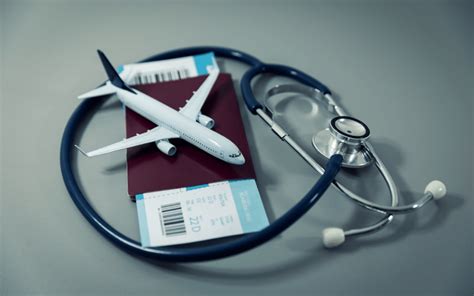Medical Travel Insurance Guide

Introduction to Medical Travel Insurance
When planning a trip, whether for business or leisure, it’s essential to consider the unexpected medical expenses that may arise during your journey. Medical travel insurance is designed to provide financial protection against medical emergencies that may occur while traveling abroad. In this guide, we will explore the world of medical travel insurance, discussing its importance, types, and what to look for when purchasing a policy.
Why is Medical Travel Insurance Important?
Medical travel insurance is crucial for several reasons. Firstly, medical costs can be extremely high in foreign countries, and without insurance, you may be faced with significant out-of-pocket expenses. Secondly, travel insurance can provide access to quality medical care, ensuring that you receive the best possible treatment in the event of an emergency. Finally, medical travel insurance can provide peace of mind, allowing you to focus on enjoying your trip rather than worrying about potential medical expenses.
Types of Medical Travel Insurance
There are several types of medical travel insurance policies available, each offering varying levels of coverage. Some of the most common types include: * Single-Trip Policies: These policies provide coverage for a single trip and are ideal for individuals who travel infrequently. * Multitrip Policies: These policies provide coverage for multiple trips within a specified period and are suitable for frequent travelers. * Annual Policies: These policies provide coverage for an entire year and are often more cost-effective for frequent travelers. * Group Policies: These policies provide coverage for groups of people traveling together and are often used by tour operators and travel companies.
What to Look for in a Medical Travel Insurance Policy
When purchasing a medical travel insurance policy, there are several factors to consider. These include: * Coverage limits: Ensure that the policy provides adequate coverage limits to meet your potential medical expenses. * Deductible: Check the deductible amount, as this will affect the amount you need to pay out-of-pocket. * Pre-existing conditions: If you have a pre-existing medical condition, ensure that the policy provides coverage for this condition. * Emergency medical evacuation: Ensure that the policy includes coverage for emergency medical evacuation, in case you need to be transported to a medical facility. * 24⁄7 assistance: Look for policies that offer 24⁄7 assistance, providing you with support and guidance in the event of an emergency.
How to Choose the Right Medical Travel Insurance Policy
Choosing the right medical travel insurance policy can be overwhelming, with so many options available. To make the process easier, consider the following steps: * Research: Research different insurance providers and policies to compare coverage and prices. * Read reviews: Read reviews from other customers to gain insight into the insurance provider’s reputation and level of service. * Check the policy wording: Carefully read the policy wording to ensure you understand what is covered and what is not. * Ask questions: Don’t hesitate to ask questions if you’re unsure about any aspect of the policy.
📝 Note: Always carefully review the policy terms and conditions before purchasing, to ensure you understand what is covered and what is not.
Common Medical Travel Insurance Exclusions
It’s essential to understand what is excluded from your medical travel insurance policy. Common exclusions include: * Pre-existing conditions: Many policies exclude pre-existing medical conditions, unless specifically stated. * Participation in hazardous activities: Policies may exclude coverage for injuries sustained while participating in hazardous activities, such as skydiving or rock climbing. * Non-emergency medical treatment: Policies may exclude coverage for non-emergency medical treatment, such as routine check-ups or cosmetic procedures. * Travel to high-risk areas: Policies may exclude coverage for travel to high-risk areas, such as countries with high levels of conflict or disease outbreaks.
Claims Process
In the event of a medical emergency, it’s essential to understand the claims process. This typically involves: * Notifying the insurance provider: Notify the insurance provider as soon as possible, to report the incident and initiate the claims process. * Providing documentation: Provide documentation, such as medical records and receipts, to support your claim. * Following the claims procedure: Follow the claims procedure, as outlined in the policy wording, to ensure your claim is processed efficiently.
| Insurance Provider | Coverage Limits | Deductible |
|---|---|---|
| Provider A | $100,000 | $500 |
| Provider B | $200,000 | $1,000 |
| Provider C | $500,000 | $2,000 |
In summary, medical travel insurance is a crucial aspect of planning a trip, providing financial protection against unexpected medical expenses. By understanding the different types of policies, what to look for in a policy, and how to choose the right policy, you can ensure you have adequate coverage for your next adventure. Remember to always carefully review the policy terms and conditions, and don’t hesitate to ask questions if you’re unsure about any aspect of the policy.
To finalize, it is essential to have the right medical travel insurance policy to ensure a safe and enjoyable trip. By following the guidelines outlined in this guide, you can make an informed decision and choose a policy that meets your needs.
What is medical travel insurance?
+
Medical travel insurance is a type of insurance that provides financial protection against medical expenses that may arise during a trip.
What types of medical travel insurance policies are available?
+
There are several types of medical travel insurance policies available, including single-trip, multitrip, annual, and group policies.
What should I look for in a medical travel insurance policy?
+
When purchasing a medical travel insurance policy, look for coverage limits, deductible, pre-existing conditions, emergency medical evacuation, and 24⁄7 assistance.